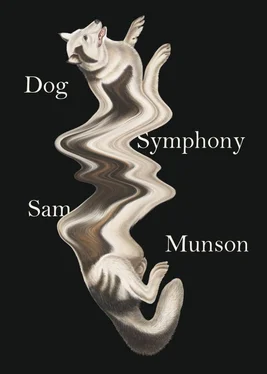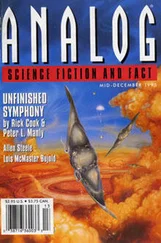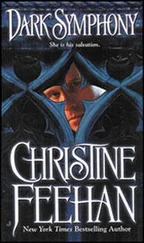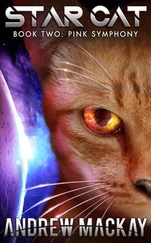I assured them I would not reveal any information. The promise seemed absurd as I said it. What authority did a group of dogcatchers have over human life? And I had to investigate, these were the vans from Avenida Zenz. I asked the two cousins to make my excuses to their parents for me. They said nothing, they smoked, that’s all. I crept back inside, past a room (drowned in the blue glow of television) from which sweet, idle fraternal/matrimonial chatter drifted, interrupted by frantic outbursts (Boca was losing). In the kitchen, I found a back exit, a screen door. Beyond it juniper thickets hovered in the darkness. As I padded out onto the Taquinis’ tiny lawn the creaking of the verandah swing slowed, slowed, ceased. The human voices in the upstairs parlor: these too faded. On the roof of the blue van two dark protuberances emerged, round and hard-looking, on thick stalks. I saw them as I was trotting over, screening myself with the juniper hedges, until I was near enough to observe the driver and the other two.
They were waiting. The meat-bag holder whistled a short phrase from the Dog Symphony. The club wielders whistled the next. All three chuckled, a glottal syncopated laugh. Possibly only one laugh but issuing from three throats. They choked it off before it could die naturally. The meat-bag holder eyed the van. On the lip of the rolled-down passenger window a well-molded arm in a sky-blue sleeve rested, the hand thin and strong, the nails blunt, a silver watch manacling the wrist. This fourth figure, not in uniform, was otherwise concealed by darkness. The juniper leaves pricked my face as I looked through the hedge gaps. The driver had opened her bag of meat and tossed the slabs out onto the asphalt of Iturri, where they landed with wet, osculatory noises. The two club wielders stood and stared toward Newbery, tapping their palms with their weapons. Faint, sparse barks and a narcotic rustling. I heard those familiar noises, along with the chiming the tags of the night dogs made, a chiming that grew louder, clearer and clearer, until I realized that a pack was ambling along Iturri, ready to join their fellows in the rush to La Chacarita. The meat that had been thrown into the street stopped the dogs and they began to chew with the same subtle care they displayed during my first observations.
The bag holder whistled. Two floodlights — the dark roof protuberances — burned to life. I had to shield my eyes with fingers made pink by the glare. When I was able to look at the street through the hedge again I saw four dogs, a Hungarian mudi, two whippets, and a juvenile rottweiler, all light-stunned, rags of meat dangling from their jaws. Blood tinted the whippets’ adze faces. They stood shivering monastically as the club wielders went to work, striking the night dogs (almost regretfully) on their necks, just behind the bulges of their skulls. Each dog made a yelping whine as it went down. Once the dogs hit the asphalt, the club wielders — their escutcheon-shaped badges blank with light — struck them again across the skull. They had not killed the animals. I saw the pelts between the ribs of the lean whippets inflating and deflating. The club wielders threw open the rear van doors; the van’s cargo area had been fitted with a cage — and in this cage sat and whined two other dogs, a beagle and a Weimaraner, on short chain leashes looped through dirty steel grommets screwed into the van wall. The club wielders tossed the unconscious dogs through the cage door. The taller one started to fasten new chains around their necks while the four were still dazed; the shorter one kept watch, club at the ready, on the beagle and the Weimaraner. The two dogs just stared. The bag holder came around to the cage with a clipboard and the hideous noise of writing arose. The taller club wielder said: Should we let her have a look at them now? The bag holder spat out her answer: Of course. The passenger door had already opened and the fourth figure was striding toward the oval zone lit by the flood lamps, striding and striding, the way a goddess strides across a field, a classical meadow flooded with light, for example. But before the woman had entered the oval of glare (she stood at its lip, rendered completely obscure by her proximity to the light) the shorter club wielder aimed his cudgel across the street at the juniper hedge concealing me and screamed: Hey asshole, what the fuck do you think you’re doing?
I started to run as soon as the club wielder turned to face me. His wide cheeks grimy with stubble, afloat in the white light, adrift in the white light, aloft in the white light. A face I almost, in fact, recognized. I ran southeast on Iturri, so they would have to pull the van around if they wanted to chase me in it, I thought, and ran along Concepción Arenal toward the Parque Los Andes. There I could hide myself among Paraná pines, jacaranda, bryophytes, and the underbrush my namesake wrote about with such diarrheal eloquence. The empty streets aided me here. I was able to run with tremendous speed and ease because I faced no human obstructions, no hate-filled primate stare. The few dogs not already on Newbery paid me no mind; they either ate and drank or trotted on, their breathing velvety and punctuated by the modest chiming of tags. I wanted to warn them — but dogs do not speak and do not understand (or so I thought then). I said nothing. The wide-faced club wielder kept shouting behind me: Hey asshole! Hey asshole, get back here! His breath more and more ragged between each cry and his footsteps slowing, as if sleep were descending upon him. Victor, let him go, a female voice shouted. Fuck you, Victor shouted back, it’s our job. Yet I heard only his footsteps. I realized these were the footsteps of a drunken man. The light, inconsequent stagger that expresses drunken inquiry. By the time I reached the lip of the park, I heard nothing at all behind me except for dimming shouts. He’s just some asshole, let him run, I won’t report you, and you have to admit he’ll probably end up with us anyway. Under these circumstances this Victor ended his pursuit and I stumbled across a high, cracked curb into the park.
A car’s ignition coughed and coughed, its motor wheezed and thrummed, but the sound faded. Heading westward, I thought. I had almost regained my breath when two loud, at-hand, penitential sounds broke the leafy silence. Or rather the enleafed silence. Nine or ten yards from the ombu stand I was concealed in, near a crushed Quilmes can coated with oblique streetlamp glow, two brown mutts copulated vigorously. They kept up countermelodic howls, answered from near and far by howls and cries of their fellows. The night calling out to itself.
MY RETREAT TO THE Parque Los Andes lasted for hours, until I was absolutely sure no University police remained nearby. I got back to the Pensión Vermesser exhausted, but I did not sleep. As morning arrived, gray and gold, I planned my return to campus. I called a taxi after I showered. The shower did nothing to alleviate my exhaustion. I greeted the impassive, deep-eyed driver with a stony nod. The distance between my head and feet seemed to increase and decrease without warning. My visual field fishbowled as I dragged the sandy detritus of another sleepless night from the corners of my eyes.
There was an official reason for my visit. The conference was proceeding at its normal pace, indifferent to my inane and hard-to-understand difficulties. I was due to participate in a session taking as its theme — here I also saw Ana’s arranging hand — a subject that had fascinated me since I first entered my profession: the prison system of ancient Mongolia. Our most primal prison, our most supreme and invisible prison. Nothing but pits dug out of the Scythian earth supervised by a jailer on horseback. This system contained many surprising intricacies, more than enough material to keep a conference in vivid and rebarbative argument all day.
Читать дальше












